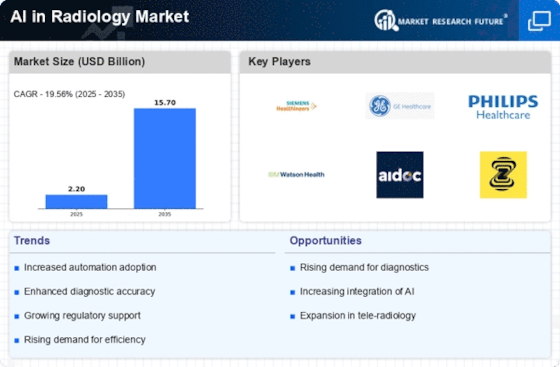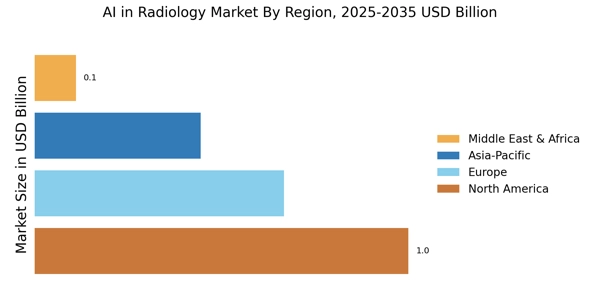Growing Focus on Cost Efficiency
Cost efficiency emerges as a pivotal driver in the AI in Radiology Market. Healthcare organizations are under constant pressure to reduce operational costs while maintaining high-quality patient care. AI technologies offer solutions that streamline workflows, reduce the time required for image analysis, and minimize the need for repeat scans. A study indicates that implementing AI in radiology can lead to cost savings of approximately 20% in operational expenses. This financial incentive encourages healthcare providers to invest in AI solutions, thereby accelerating the growth of the AI in Radiology Market.
Rising Demand for Diagnostic Accuracy
The AI in Radiology Market experiences a notable surge in demand for enhanced diagnostic accuracy. As healthcare providers strive to improve patient outcomes, the integration of AI technologies into radiology practices becomes increasingly vital. AI algorithms, capable of analyzing vast datasets, assist radiologists in identifying anomalies with greater precision. This trend is underscored by a report indicating that AI-driven diagnostic tools can reduce error rates by up to 30%. Consequently, the emphasis on accurate diagnostics propels investments in AI solutions, fostering growth within the AI in Radiology Market.
Regulatory Support and Standardization
Regulatory support and standardization play a crucial role in the AI in Radiology Market. As AI technologies gain traction, regulatory bodies are increasingly establishing guidelines to ensure safety and efficacy. This regulatory framework fosters trust among healthcare providers and patients, facilitating the adoption of AI solutions. Furthermore, standardization of AI algorithms enhances interoperability between different systems, promoting seamless integration into existing workflows. The establishment of clear regulations is expected to drive market growth, as stakeholders gain confidence in the reliability of AI applications in radiology, thereby bolstering the AI in Radiology Market.
Increased Investment in Healthcare AI Startups
The AI in Radiology Market is witnessing a surge in investment directed towards healthcare AI startups. Venture capitalists and private equity firms are increasingly recognizing the potential of AI technologies to transform radiology practices. This influx of capital enables startups to innovate and develop cutting-edge AI solutions tailored for radiology applications. Reports suggest that investments in healthcare AI startups reached over 10 billion dollars in the past year, indicating a robust interest in this sector. As these startups continue to emerge and evolve, they contribute to the dynamic landscape of the AI in Radiology Market.
Technological Advancements in Imaging Techniques
Technological advancements in imaging techniques significantly influence the AI in Radiology Market. Innovations such as 3D imaging, advanced MRI, and CT scans enhance the capabilities of AI algorithms, enabling them to process and interpret complex imaging data more effectively. The introduction of deep learning models has revolutionized image analysis, allowing for faster and more accurate diagnoses. As a result, healthcare institutions are increasingly adopting AI solutions to leverage these advancements, which is reflected in a projected market growth rate of 25% over the next five years. This trend highlights the critical role of technology in shaping the AI in Radiology Market.

















